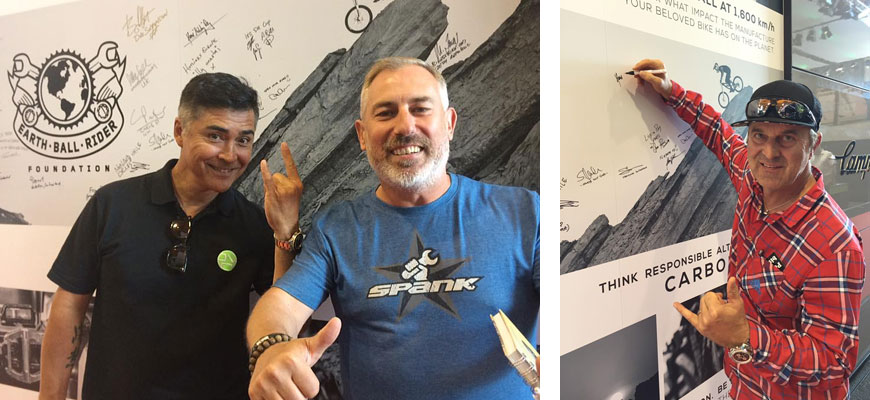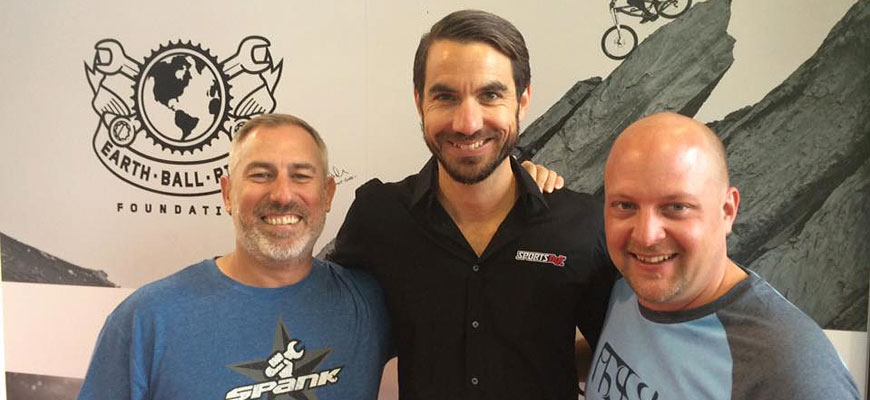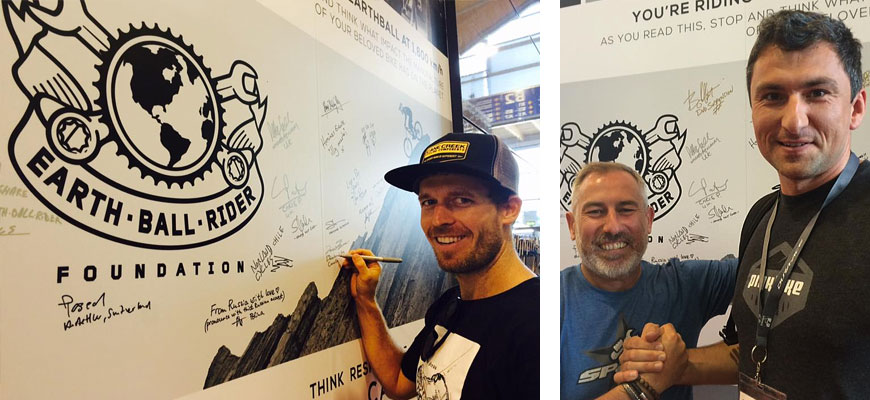Big things are starting to happen:
Join the discussion.
Become the movement.

We’re all riding the earthball at a speed of 1,600 km/h right now!
AS YOU READ THIS, STOP AND THINK WHAT IMPACT THE MANUFACTURE OF YOUR BICYCLE HAS ON THE PLANET.
A diverse collective of bicycle brands, designers, manufacturers and riders who aim to challenge the way the industry and the consumer looks at materials and manufacturing practices.
Initiated by manufacturers and producers SPANK Industries and iXS Sports Division, the Earthball Rider Foundation is fast attracting distributors, brands and riders alike in support of opening dialogue on the subject.
“Carbon fiber and textiles are often uncomfortable subjects,” says foundation chairman Gavin Michael Vos. “We all perhaps spare a thought for the subject, but very rarely get drawn into discussion about the impacts that these materials and manufacturing practices may have in the long term.”
“The Earthball Riders Foundation will facilitate dialogue and sharing of information towards educating consumers, and industry, on the ‘DNA’ of the product they choose,” adds Pascal Haf, Brand Manager for iXS Sports Division.

Both SPANK Industries and iXS Sports Division have been making a conscious choice in support of sustainable materials and production processes in its product development for many years. Both compete without any carbon fiber in their product portfolios in a sector that is widely supportive of the notion that carbon fiber is the benchmark in excellence.
“It’s not that we are anti-carbon fiber,” says founder Gavin Vos, “it’s just that we are anti the way it is being used in the bicycle industry. Consumers are bombarded with the marketing message that carbon fiber is best, and we feel that this has created an excessive proliferation of carbon fiber into the mass market, the majority of which we believe is over qualified for the consumer’s needs.”
SPANK Industries has made a concerted effort to develop safe and affordable alternatives to the excessive use of carbon fiber in the bicycle manufacturing industry. “Our application of new age alloys and foam dampening systems are good examples of safer and responsible alternatives to carbon fiber. While we do not deny that alloy processing is not without its impact on the environment, its virtues, including it’s almost endless life cycle (recyclability) and its cost effectiveness, outweigh the negatives as the most sustainable option available right now.”
Pascal Haf shares this sentiment in context of helmet design and production. “We have chosen very specifically not to include any carbon fiber into our award winning trail and full face helmet lines. While we recognize the virtues of carbon fiber, we believe that it has a place in a very small niche in the bicycle sector and we do not support the excessive application of this non-recyclable in mass production.”
“As a company that manufactures and markets top-quality sports textiles, we are concerned to give due weight to the aspect of sustainability, not just in the area of raw materials, but also in connection with the procurement and processing of those materials, and right through to the distribution of the finished product on the global market,” adds Haf.

iXS utilises material based on recycled plastic from PET bottles in the production of its trail, freeride and race apparel lines. This results in a top-quality polyester textile, saving up to 50% of the energy used in the production process and around 50% of CO2 emissions.
Very little is really available in terms of facts and figures about the potential impacts of the sheer scale of carbon fiber production prevalent in the market place at large today. A tight collective of around seven carbon fiber raw material manufacturing plants exist worldwide in total. Manufacturing processes are closely guarded and little is forthcoming in defence of concerns that high toxicity levels and excessive energy consumption are irrevocably part of the process.
Google searches on carbon fiber bicycle frames and rims reveal horrific images of bike and wheel dumps sites. While responsible carbon fiber frame manufacturers in the industry have initiated programmes to reclaim old carbon fiber frames for recycling purposes, as there is, in reality, currently no viable recycling process in operation for carbon fiber.

“If we want to continue enjoying the outdoors the way we do now for many years to come, we have to be accountable for the choices we make regarding the products we use,” says Earthball Rider Foundation member and rider Richie Schley.
It’s not just about environmental impacts however. The high costs of carbon fiber products are also impacting on the potential growth of the industry.
To date, industry roleplayers that have joined the Earthball Riders Foundation include SportsNut GmBh, Bikestrike, Crankworx, Live to Play Sports, Hans Rey, Richie Schley, Geoff Gulevich, Fratelli Industries, Anvil Industries, The Gravity Cartel, Intercycle AG, Mountain Bike Rider Magazine and Spoke Magazine.
Earth Globe
Represents our planet, and home, and the environmental and ecological aspect of the foundation.
Wings
Symbolizes rising above the challenges that lie ahead.
Chain
Configured in the shape of an infinity loop, it symbolizes unlimited potential and the equality of opposing forces (yin & yang). It also references a DNA helix, which points to the nature (origin and substance) of the “rider” and the product.
Crank
The driving force behind the foundation is the cycling fraternity; riders and OEM’s.
Tools
This is a representation of the manufacturing industry, the “thought changers” and true source of the solution.